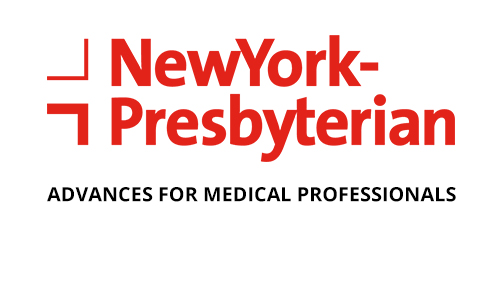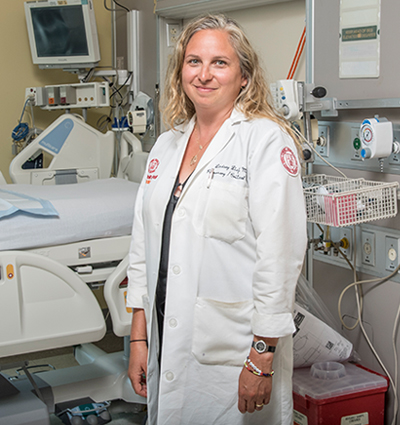The Road Back: Helping Patients Recover Post-ICU
Dr. Lindsay Lief
Advances in critical care medicine have resulted in growing numbers of patients who survive critical illness. However, intensive care unit survivors are at risk for post-intensive care syndrome, which can affect mental and physical health, cognitive function, and the ability to care for oneself and return to work. To assist these individuals in their recuperation, the Division of Pulmonary and Critical Care Medicine at NewYork-Presbyterian/Weill Cornell Medical Center has established a Post-ICU Recovery Clinic under the direction of Lindsay Lief, MD.
“Post-intensive care syndrome is a constellation of symptoms that can happen after a patient endures an ICU stay, be they cognitive, emotional, or physical symptoms. And now also we include social isolation and financial hardship as part of this syndrome,” says Dr. Lief, who serves as the Medical Director of the Medical Intensive Care Unit.
While Dr. Lief cannot predict who will suffer from post-intensive care syndrome, she notes that certain populations are at higher risk, including individuals placed on mechanical ventilation for several days, those who required sedation while in the ICU, those who experienced delirium or episodes of confusion while critically ill, and those who had septic shock or acute respiratory distress syndrome. “All of these patients are at higher risk of suffering from post-intensive care syndrome, while patients admitted to the ICU for a very short stay are at much lower risk,” she says.
With the increased number of patients at risk for post-intensive care syndrome following the surge of COVID-19 ICU admissions, Dr. Lief and her team reinforced partnerships with colleagues in Rehabilitation Medicine, Pharmacy, Food and Nutrition Services, Psychiatry, and Social Work to ensure there are enough resources to accommodate all the patients that may need their expertise.
The first follow-up visit to the Post-ICU Clinic lasts from one to two hours, with the clinician posing a range of probing questions. “We ask how the patient is sleeping, eating, and if they remember or know what happened to them while in the hospital,” says Dr. Lief. “Many people have no memories of being in the ICU. So, often we start with retelling the story of their hospitalization and taking them through each day or week by week and discuss any complications of their hospital stay in order to reconcile their memories with what happened to them. Then we talk about how they’re recovering, asking about their life before being admitted and what it is like now. Can they take care of themselves? Do they feel like they could get back to their life, whether that was being a parent, student, a professional.”
Dr. Lief and her team also conduct validated questionnaires to screen for symptoms of emotional or psychological disturbances, including anxiety, depression, post-traumatic stress disorder, and sleep problems. “We screen for quality of life and based on the results, we may make additional referrals to mental health experts, for example,” says Dr. Lief. “A psychologist in our sleep medicine practice helps patients with insomnia or nightmares. Our ICU dietitians can help individuals who have lost a tremendous amount of weight and want to gain it back safely.”
According to Dr. Lief, patients sometimes enter the hospital taking no medications and may leave with 10 prescribed medications. “Our pharmacologists go through those medications in detail with patients to help ensure the right medicines are being continued and the right ones are being stopped,” she says. “Frequently patients have no idea why they’re been prescribed these medications. When you don’t know the importance of them, then you may have no interest in taking them, especially if they’re expensive.”
Following a prolonged ICU stay, Dr. Lief notes that patients need assistance from providers who can help them achieve their goals and get back to a life that is familiar to them. “Often they require occupational and physical therapy and help in regaining their stamina if they have lost muscle mass,” she says. “They might also need a speech therapist if swallowing has become impaired from having a breathing tube for so long.”
“We’re here to help the patient get back to who they were before or who they plan to be. If that means the entire visit is spent dealing with PTSD, that’s what we’ll do. If it means the entire visit is dealing with shortness of breath and the inability to walk up a flight of stairs when they used to be a marathon runner, that’s what we'll do. The visit is really tailored to the patient.” — Dr. Lindsay Lief
Social workers assist patients who may have lost their jobs or insurance while hospitalized. “Now they can’t afford the one medicine that might be lifesaving,” says Dr. Lief. “Or they used to take the subway and now they need to take a taxi because they’re too weak to walk the subway stairs and there are four doctors’ appointments this week and they can’t afford that. So, we connect them to city or governmental services that can help them not only with getting emergency insurance, but also in getting emergency transportation.”
Clinic appointments also take place via video visits, which have proven to be especially beneficial in gauging a patient’s recovery. “We get to see the patient in their own home and environment,” says Dr. Lief. “If I ask a patient, did you walk up a flight of stairs, she can pick up her phone and walk up a flight of stairs with me. I can see them stand up independently from the couch or they can show me why it’s a struggle to get in and out of bed. Watching a patient navigate in his or her own home is very valuable.”
“In New York alone, thousands of patients who suffered a very significant and traumatic ICU stay might need follow-up intensive care treatment,” she says. “The public and the media are learning about post-intensive care syndrome and the value of our practice. We are seeing patients who’ve been in intensive care units all over the city who are referred to us for a comprehensive screening and referral to providers to help them get back to their lives.”
Dr. Lief has long collaborated with colleagues in the Cornell Center for Research on End-of-Life Care, the Division of Geriatrics and Palliative Medicine, and the Division of Pulmonary and Critical Care Medicine to study peritraumatic stress in the early phase of post-ICU recovery. In an article in press in the September 2020 issue of Annals of the American Thoracic Society, they collected data between July 2018 and November 2019 on 15 patients admitted to the medical ICU for respiratory failure or sepsis, providing insight into their early post-ICU recovery experience. Peritraumatic dissociative symptoms were common during hospitalization, as well as clinically significant depression, anxiety, and trauma-related symptoms prior to discharge and at one-month post-discharge. Most patients were interested in stress management resources before leaving the hospital.
“Overall, this small study draws attention to the peritraumatic stress symptoms experienced by ICU survivors in the early post-acute recovery period, an under-recognized phenomenon,” says Dr. Lief. “Prioritizing research and clinical innovations to maximize psychological recovery for ICU survivors continues to be urgently needed. And as the COVID-19 pandemic response begins to include survivorship care, multidisciplinary efforts should include a strong focus on psychological health.”
Reference Article
Derry HM, Lief L, Woubeshet N, Schenck EJ, Kakarala S, LaFond E, Berlin DA, Prigerson HG. Peritraumatic stress symptoms during early post-ICU recovery. Annals of the American Thoracic Society. 2020 Sep 1. [Epub ahead of print]
Related Publications






